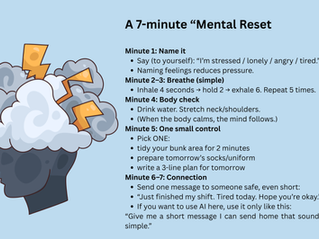Online Mental Health Support
- IMEQ CENTER

- Apr 25, 2024
- 4 min read

The isolation experienced while being miles away from home, the relentless demands of shipboard duties, and the minimal social interaction can lead to feelings of loneliness, anxiety, and depression. Unlike traditional workplace environments, the option to simply "step out" for a breath of fresh air or a change of scenery does not exist on the open sea. This can significantly impact a seafarer's mental health, affecting their productivity, safety, and overall quality of life.
That is why shipping companies should offer an online mental health support line!
Benefits of Offering Psychotherapeutic Support
Improved Mental Health and Well-being: Access to psychotherapists helps address issues like depression, anxiety, and PTSD, contributing to overall well-being.
Enhanced Safety: Mental health support contributes to better decision-making and reaction times, directly impacting safety onboard.
Increased Productivity: Seafarers with good mental health are more engaged and productive, benefiting the entire operation.
Reduced Stigma: Providing mental health services as a standard part of crew welfare helps normalize seeking help, reducing stigma around mental health issues.
Better Retention Rates: Demonstrating care for crew welfare through such services can lead to higher satisfaction and retention rates among seafarers.
Implementing and Accessing Mental Health Support
How Shipping Companies Can Implement These Services:
Partner with Telehealth Providers: Establish partnerships with providers offering mental health services, including therapy and counseling, accessible via the internet.
Confidentiality and Ease of Access: Ensure that services are confidential and easily accessible, encouraging seafarers to utilize them without fear of stigma or repercussions.
Integration into Health Plans: Include psychotherapeutic services as part of the health coverage offered to seafarers, ensuring they are free or affordable.
Onboard Awareness: Conduct regular onboard sessions and distribute materials to educate crew on recognizing mental health issues and how to access support services.
For Seafarers: Reaching Out and Starting a Conversation
Initiate Contact: Use the provided contact details to reach out to the mental health professional via chat, email, or phone call. This step can be as simple as sending a message stating your wish to talk to someone.
Confidentiality Assurance: Remember that conversations with mental health professionals are confidential, encouraging open and honest communication.
Describe Your Feelings: Start by describing what you've been feeling or experiencing. There's no right or wrong way to do this; the therapist is there to guide the conversation.
Set Up a Schedule: Agree on a schedule that suits your duties onboard for regular sessions, if needed.
Engage in Ongoing Support: Utilize the support offered as needed, remembering that mental health is a crucial part of your overall well-being.
TALKING TO YOUR THERAPIST
Establishing a strong, trusting relationship with a therapist, especially through online platforms, is pivotal for effective mental health support. Here are some examples of how you can initiate conversations and foster a relationship with your therapist, whether you're a seafarer seeking support while onboard or anyone else in need of remote mental health assistance:
Example 1: Opening Up About Stress
You: "Lately, I've been feeling overwhelmed by the stress of work and being away from home. It's hard to manage these feelings on my own. Do you have any strategies that could help?"
This opens the door to discussing specific stressors and coping mechanisms. It shows your therapist that you're seeking practical solutions and are open to guidance.
Example 2: Discussing Feelings of Isolation
You: "Being out at sea for months makes me feel isolated. I miss my family and sometimes feel like I'm losing touch with them. How can I deal with these feelings of loneliness?"
This conversation starter shows vulnerability and a willingness to work through emotional challenges, which are key to building a therapeutic relationship.
Example 3: Sharing Successes and Setbacks
You: "I tried the breathing exercises we talked about last time, and they helped me calm down during a particularly rough day. But, I still struggle with negative thoughts. Can we explore this further?"
Sharing both successes and setbacks provides your therapist with feedback on what works for you and what doesn't, facilitating a more personalized support approach.
Establishing a Relationship with Your Therapist
Be Open and Honest: The foundation of a therapeutic relationship is trust, which is built on openness and honesty. Share your thoughts, feelings, and experiences as openly as you can.
Set Goals Together: Discuss your goals for therapy early on. Setting goals together can help ensure that you and your therapist are working towards common outcomes.
Ask Questions: Show interest in the process by asking questions about your therapy journey, any techniques used, and how they can be applied to your situation.
Provide Feedback: Let your therapist know what's working for you and what isn't. Feedback is crucial for tailoring the therapy to your needs.
Be Patient: Building a relationship with a therapist takes time. Be patient with yourself and the process. Trust and rapport develop as you work together over time.
Respect Boundaries: Understanding and respecting the professional boundaries of your therapist can help establish a healthy therapeutic relationship.
Remember, therapy is a collaborative process. By actively engaging and communicating with your therapist, you're not only investing in your mental health but also paving the way for a more fulfilling and balanced life, whether at sea or onshore
IMEQ CENTER offers a mental health support line via the IMEQ SEAFARERS APP. Contact us for more: icrc@imeq-center.com





































































































Comments